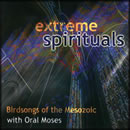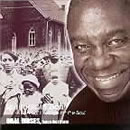
Click
to buy
Other
Recordings |
Extreme
Spirituals
Birdsongs of the Mesozoic with
Oral Moses
1.
I’m A Rollin’ MP3
2. Couldn’t Hear Nobody Pray MP3
3. A Little More Faith In Jesus MP3
4. Sometimes I Feel Like A Motherless Child MP3
5. Joshua Fit The Battle Of Jericho MP3
6. Swing Low Sweet Chariot MP3
7. Listen To The Angels Shoutin’ MP3
8. Wayfaring Stranger MP3
9. Great Day MP3
10. Nobody Knows The Trouble I See MP3
11. Oh Freedom MP3
12. Amen MP3
For
their 13th album and in their 25th year together,
post-punk, art-rock pioneers Birdsongs
of the Mesozoic do a 180 degree musical swerve
and link up with bass-baritone vocalist Oral Moses,
one of the preeminent African-American performers
of traditional spirituals. The band demolish all preconceptions
about themselves by presenting a program of heavily
rearranged, well known African-American spirituals
and 19th century art songs. The blend of Birdsongs'
cutting-edge instrumentation with the strength and
majesty of Moses' voice creates a very unorthodox
yet deeply moving sound, which The Noise called, "Totally
sublime and deeply moving." This collaboration
represents a new experiment from all parties - something
of a meeting at the crossroads between two creative
parties passing in very different directions. Together
they bring these centuries-old songs kicking and screaming
into the 21st century.
"One
of the most exciting experiments that have been
made this year in the world of avant-garde, is the
new disc Birdsongs Of The Mesozoic, in collaboration
with the American baritone singer, Oral Moses."
Rockaxis
– Spain
"Extreme Spirituals would be
a fascinating experience as an instrumental album,
but Moses' vocals are nothing short of genius. Moses
avoids the usual emotive approach to gospel shouting
in favor of a classical reading a la Paul Robeson
that interacts brilliantly with the well crafted
arrangements."
Cuneiform Records
"The
traditional thread that impacts us reverently, importantly,
and beautifully is the powerful vocal performances,
interpretations and re-creations of Oral Moses…
Moses’ magnificent voice breathes new life
and humanity into the music of Birdsongs of the
Mesozoic, revealing the timeless beauty and relevance
of this art form to diverse audiences. Oral Moses’
voice is reminiscent of Paul Robeson’s: big,
deep, profound and stirring."
Cuneiform
Records
"Moses’
vocal ability is affecting, to say the least; he
can sound both terrifyingly powerful and vulnerable,
yearning and exposed. The strongest tracks are undoubtedly
“Sometimes I Feel Like a Motherless Child”
and “Swing Low Sweet Chariot,” both
somewhat minimalist in instrumentation when compared
to the rest of the album. On the former, Moses’
drawn out lamentations are poignantly accompanied
by Ken Field’s haunting flute."
Exclaim!
Canada's Music Authority
|

Click
to buy
Other
Recordings |
Spirituals
In Zion
Oral
Moses -
bass-baritone
1.
Nobody knows de trouble I see
WAV
2. A little more faith in Jesus
3. And he never said a mumberlin' word
WAV
4. Tryin' to get ready
WAV
5. Po' pilgrim of sorrow
WAV
6. I'm a rollin'
WAV
7. Listen to the Angels shouting
WAV
8. Ev'ry time I feel the spirit
WAV
9. Go down Moses
WAV
10. I want to be ready
11. Oh Freedom
WAV
12. Deep River
WAV
13. Joshua fit de battle ob Jericho
WAV
14. ’Tis the old ship of Zion
WAV
15. Steal Away
WAV
16. Great Day!
WAV
17. My Lord, what a mourning
18. Nobody knows the trouble I've seen
WAV
19. Swing low, sweet chariot WAV
An
A capella CD of Nineteen Negro Spirituals by bass-baritone,
Oral Moss celebrates the history and strong music
tradition of Old Zion Baptist Church in Marietta,
Georgia.
This
135-year-old Zion Baptist Church which was built by
enslaved African Americans in 1868 will become a museum
to house its history and other African American churches
in Georgia.
In
an attempt to recapture the true musical sense under
which these spirituals 'sprang' into existence all
nineteen spirituals were recorded in Old Zion Baptist
without any instrumental accompaniment
Oral
Moses, bass-baritone and Professor of music at Kennesaw
State University in Kennesaw GA.
CD
release recital and preview is Sunday, October 12,
2003 in the Old Zion Baptist Church.
ZION
BAPTIST CHURCH
A
SPIRITUAL HERITAGE FOR THE SOUL
In
1619, twenty-two persons from different countries
and tribes on the continent of Africa, landed in Jamestown,
Virginia and were quickly bought and sold into the
non-human existence of slavery. From this arduous
and painful slave life sprang a poignant and powerful
music genre that has become one of the most significant
segments of American music in existence. As you listen
to this unique recording of unaccompanied Negro Spirituals,
bass-baritone, Oral Moses transports you into this
deep dark world bondage. Moses' deep resonant voice
is well suited to command the strength, power and
aesthetic beauty needed to maintain and support the
strong tradition and characteristic elements that
are so essential and inherent in the Negro Spiritual.
The Negro Spiritual, sometimes referred to as plantation
songs, sorrow songs or slave-songs, originated from
the innermost being of enslaved Africans who were
captured from the West Coast of Africa and transported
to the Americas. While in bondage they were forbidden
to talk or make musical instruments that they had
used in Africa but could sing whatever they felt.
The gift of singing became an invaluable tool of expression
and a relief from the cruel and brutal existence of
a slave-life. It is in these simple African melodies,
which, "sprang into existence," where the
enslaved Africans expressed their pain, anger, grief,
faith and joy. Just as Africans communicated among
themselves using drum language in there own countries
and tribes, so did the enslaved Africans continue
to do in America by using "cries," "hollers,"
"calls," "shouts," which eventually
evolved into spirituals and work songs. To the slave
owner, it may have been entertaining to hear the slaves
sing these "simple" songs of faith, but
for the enslaved person these songs were powerful
messages of hope, a way of assuaging their unfortunate
plight in life and above all fighting to maintain
the most basic form of human dignity that would help
them sustain and endure the arduous hardships of a
slave existence. These plantation songs united and
strengthened the slaves and gave them an abiding faith
and strong courage.
These
simple melodies still cause people today to examine
themselves, tap their toes, clap their hands, shed
tears, laugh, dance and shout. This music still has
the ability to touch the human spirit and have a lasting
effect on one’s emotions and beliefs. The simplicity
of the melodies makes room for a singer to improvise
during a performance, even if only a single note is
added to the original melody "as the spirit moves".
This may vary greatly from one performer to another.
In it's original form the spiritual was free in form,
rhythm, text, and performance styles and allowed for
much variation from singer to singer as it was passed
on orally. Such characteristic features are typical
and unique to the Negro Spirituals. As stated in Slaves
Songs In The United States,
"The
best that we can do, however, with paper and types,
or even with voices, will convey but a faint shadow
of the original. The voices of the colored people
have a peculiar quality that nothing can imitate;
and the intonation and delicate variations of even
one singer cannot be reproduced on paper. And I despair
of conveying any notion of the effect of a number
singing together."
"And
what makes it all the harder to unravel a thread of
melody out of this strange network is that, like birds,
they seem not infrequently to strike sounds that cannot
be precisely represented by the gamut, and abound
in "slides" from one note to another, and
turns and cadences not in articulated notes."
"It is difficult to express the entire character
of these Negro ballads by mere musical notes and signs.
The odd turns made in the throat, and the curious
rhythmic effect produced by single voices chiming
in at different irregular intervals, seem almost as
impossible to place on the score as the singing of
birds or the tones of an Aeolian Harp."
This performance of solo-unaccompanied Negro Spirituals
is presented in a very unique form that will add greatly
to its enjoyment. Moses, with his rich voice, has
carefully performed these songs with natural interpretation
and precision, which adds much to the simple but beautiful
and rich melodies of the African-American culture.
One can hear an effective use of a wide vocal range,
good diction, precise rhythm and beautiful dynamics.
Anyone
who has the desire to sing the Negro Spirituals will
find this recording a useful tool for learning. And
for those who wish to listen to the music for the
sake of satisfying the needs of the spirit and soul,
these Negro Spirituals will be the "Balm in Gilead"
that will make you whole.
Of
the many thousands of Spirituals that is said to exist
within this vast body of African-American song literature
only nineteen are recorded in this collection. Included
here are spirituals that well represent three groups
that are commonly use to catalogue these musical jewels.
(1) The slow, sustained, long-phrase melody include
songs, "Nobody knows de trouble I see,"
and "My Lord what a mourning," performed
with great depths of understanding and feeling. The
variations of the melody, the meditative mood and
the occasional free rhythm bring out the beauty of
the song. Added words and notes are used in certain
phrases as a way of personal but effective interpretation.
Successful execution of this performance practice
is achieved only when the performer has true knowledge
and understanding of the song(s). The Spiritual, "I’m
trying to get ready," is performed with a steady
beat which reminds one of listening to these people
singing and stomping their feet on wooden floors of
the old country church as they fervently worshipped
and praised God. Listen for the sincere desire to
"try on my long white robe". (2) The signal
songs or "coded" spirituals are those with
hidden or double meanings and oft-times coded messages.
Such songs were used often among the slaves to signal
or give warning to each other of some secret meeting,
plan of escape or to avoid capture. Among these songs
are, "And He never said a mumbelin’ word,"
"Go down Moses," "Oh Freedom,"
and "Steal Away to Jesus."
(3)
The "call and response chant" Spirituals
with syncopated, segmented melody include, "
I want to be ready; or, walk in Jerusalem just like
John," " Ev'ry time I feel the spirit moving
in my heart I will pray," and "A little
more faith in Jesus." He creates a totally different
mood with crisp rhythms, syncopation and dynamics,
with this well-known call and response form. These
lively performances bring out the joy in the singer’s
heart and I am sure will be contagious.
The
Negro Spirituals are very unique to the American music
culture and I thank people like Oral Moses who help
to preserve this vital and significant music tradition.
|